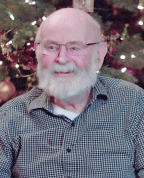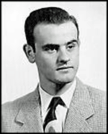
Bill Houff
The Rev. Dr. William “Bill” Houff, dedicated parish minister, activist against war and racism, devoted husband, and lover of the farming life and land from his youth, died, aged 85, on 26 January 2014 in hospice care at the Rockwood South Hill retirement facility in Spokane where he and his late wife, Patty, had lived for several years.
Growing up in very modest circumstances on a Shenandoah Valley farm during the Great Depression, Bill could remember his boyhood allowance of one penny a month and the coming of electricity to his family’s farm as a memorable event. In a very conservative religious environment, he recalled that there was little display of family affection or emotion and that his father was “a man of few words.” At his graduation from an unaccredited high school, Bill began driving a local school bus, having no clear sense of direction for his life. But when he heard by chance about a state-wide competition for a four-year chemistry scholarship at the College of William & Mary in “far away” Williamsburg, a native curiosity and a sense of adventure led him to enter . . . and to win! Against the hope of his parents that he would inherit the farm, they reluctantly helped him pack up his modest belongings in the family Hudson and drove him 160 miles to his new college home. Bill plaintively recalled that the moment when his parents said goodbye and headed their Hudson west back across the Blue Ridge to their farm was the moment when he became an “orphan.” Years later he spoke to a future ministerial colleague of the pain he still felt for the despair of his parents, who were sure that their son’s adult religious path had doomed his soul to eternal hell.
Even after breaking away from his austere boyhood environment, moving on through eighteen years of study and work in the field of chemistry, and finally serving thirty-five years in Unitarian Universalist parish ministry, Bill never lost the sense of deep connection to the land and to the life of self-sufficient independence. When the opportunity came in his forties to recover some of his childhood pleasure in farming and carpentry, Bill acquired acreage near Spokane, which he named “Still Point Farm,” and on which he constructed, by his own hands, a main house and several other outbuildings—work and ownership in which he took great pride and joy.
William Harper Houff was born on 27 April 1928 near the village of New Hope, Virginia, the only son of Harper P. Houff and Anna Elizabeth Wilberger. He took a B.S. in chemistry with Phi Beta Kappa honors from the College of William and Mary in 1950, earning living expenses by working all four years as a waiter at the Travis House, one of the colonial-style restaurants operated by Colonial Williamsburg, Inc. Despite a strong academic record, he always said he learned more in his Travis House experience than in his college course work. A brief marriage during his undergraduate years ended when his wife Lucille returned to the New Hope area with their infant son, Konrad, never more to be a part of Bill’s life. Mr. Houff went on to Michigan State University for graduate study in chemistry, earning an M.S. in 1952 and a Ph.D. in 1955. In Michigan he met and married Donna Hall, who became the mother of his second and third sons, Gregory and Robert.

Bill Houff
Eschewing an academic career for the better-paying corporate world, Dr. Houff stayed on in Michigan for a first job out of school, but then took a new position in Albany, New York, where, driving around one day, he chanced upon a “Wayside Pulpit” sign in front of the local Unitarian church. Intrigued by its liberal message, after having had no church involvement since leaving home ten years earlier, he made some Sunday morning visits, quickly joined, and soon became an active lay leader. By the early 1960s, he had moved on to a research job with Shell Oil in the San Francisco Bay Area and to membership in the Mount Diablo UU church in Walnut Creek, where the ministerial leadership of the Rev. Aron Gilmartin and the proximity of a UU seminary led him toward serious interest in parish ministry. Mr. Houff earned his B.D. from Starr King School for the Ministry in 1964. Meanwhile his marriage to Donna ended in divorce.
Ordained to the Unitarian Universalist ministry in 1964, the newly Rev. Mr. Houff served the UU Fellowship of Redwood City, California, from 1964 to 1968, the UU Church of Shoreline, Washington, from 1968-1973, and then the UU Church of Spokane, Washington, in his longest settlement from 1973 to 1988, during which the congregation’s membership doubled. It was in Spokane that Bill finally met his soul mate, Patricia “Patty” Meagher McTigue, to whom he was married for more than thirty-five years until her death in 2012. In retirement, Bill and Patty enjoyed world travel.
Leaving the Spokane congregation as Minister Emeritus at age sixty, Mr. Houff moved on to a series of interim ministries at the First UU Church of Winnipeg, Manitoba (1988-89), the UU Church of Greensboro in Jamestown, North Carolina (1989-90), the UU Congregation of Asheville, North Carolina (1990-91), the Unitarian Church of Vancouver, British Columbia (1991-93) and the University Unitarian Church of Seattle, Washington (1997-99), having along the way qualified himself as an Accredited Interim Minister in 1992.
Mr. Houff was also active with the wider Unitarian Universalist network and with his colleagues in the UUMA. In 1964-65 he served as president of the Bay Area Ministers Association and as chair of the Pacific Central District Personnel Committee, and from 1967 to 1970 he chaired the Student Affairs Committee at Starr King School. In the early 1970s he served as the Ministerial Settlement Representative for the Pacific Northwest District, in which role he so impressed the ministerial search committee of the Spokane church that, at their request, he resigned that position to become their candidate for the Spokane pulpit.
In his Spokane ministry, he began preaching about spiritual growth and mysticism in what he called a “theological metamorphosis”—not abandoning but expanding his earlier scientific humanism—a journey on which he became a frequent workshop leader for ministerial colleagues and laypeople over the years. It was as a theme speaker for the Eliot Institute in 1984 with the title “Through the Eye of the Needle: Toward Oneness” that he began thinking about putting these insights into writing. The resulting book, Infinity in Your Hand: A Guide for the Spiritually Curious (Melior Publications, 1989), was republished under the UUA’s Skinner House imprint in 1990 and was widely used for adult study in UU congregations.
Bill Houff had a deep and long-standing commitment to social justice, which he in time came to see in a profoundly spiritual perspective. Early in his ministry he joined a huge turnout of Unitarian Universalist ministers in traveling to Alabama for the 1965 march from Selma to Montgomery. Later he marched in a San Francisco protest of the Vietnam War and the use of napalm on Vietnamese civilians. In 1984, at the Spokane church, Bill delivered a sermon titled, “Silent Holocaust,” in which he described life-threatening negligence in the nuclear industry. The sermon served as a catalyst for his founding and leadership of the Hanford Education Action League (HEAL), a grassroots nuclear concern group, focused especially on dangerous practices at the nearby Hanford nuclear facility.
In later years, Bill and Patty were both active in community activities and Bill was honored for his service as a volunteer chaplain for Hospice of Spokane. For a time they shared a home with Patty’s mother, making it possible for her to live out her years, to the age of nearly 100, in the daily embrace of family.
The Rev. Marvin Evans, a long-time friend, offers this perspective:
“Bill at the Unitarian Church of Spokane and Bill at the Still Point Farm were in a very real sense not the same Bill Houff. When he spoke from the pulpit at the church and when he spoke at the feed store in Newport, you were experiencing two very different versions of William Harper Houff. These two versions blended together made for one of the most interesting people I have ever known.”
Bill Houff is survived by sons Konrad Crist, and Gregory and Robert Houff, by grandchildren Torin, Marina, and Trevor, and by several stepchildren, one of whom, Patty’s daughter Kathleen McTigue, is also a UU minister. Bill was preceded in death by his parents, his sister Anna Lee, and his wife, Patty.
A memorial service for the Rev. Dr. William Houff was celebrated on February 12, 2014, at the Unitarian Church of Spokane. Memorial gifts may be made to the Inland Northwest Land Trust, 33 W. Main Ave. Spokane, Wash, 99201-1017. Notes of condolence may be sent in care of Greg Houff, 1002 Golden Hills Drive, Cheney, Wash. 99004.
[Editor’s note — Some of the material in this obituary is drawn from a memoir written by the Rev. Marvin D. Evans, one of Bill Houff’s closest and longest-time friends. Mr. Evans’ full memoir may be found at this link.]
